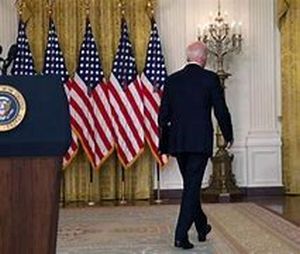No Regrets
From The New CriterionThe headline of the year, perhaps of the century, appeared on the website of NBC news four days after the Taliban captured Kabul, forcing the Afghan president to flee the country and the US to evacuate its embassy and three days after President Biden’s address to the nation in which he said “I do not regret my decision to end America’s war-fighting in Afghanistan.” Never mind that this was a fudge, one of many in the speech. “America’s war-fighting in Afghanistan” had for all practical purposes ended some time ago. What he had ended was America’s military presence in Afghanistan as a backstop and support for the Afghan national army, which everybody knew (or ought to have known) could hardly be expected to stand against the Taliban without it. To say that he had no regrets about that was tantamount to saying to hell with the Afghans, to hell with 20 years of American and allied military effort in Afghanistan and to hell, especially, with all those, Afghan and non-Afghan, friends and enemies, who put their trust in America and America’s word. We’re out of here.
At the time it seemed almost unbelievable that he could treat what, on any reckoning, was an American national humiliation on a scale not seen in nearly half a century with such insouciance — even suggesting, by saying he had no regrets, that that humiliation was what he’d envisaged all along. It was nothing to do with him; he was only the commander-in-chief. The real failure was that of the Afghans themselves — or perhaps Donald Trump, who came up with the idea of the Afghan exit in the first place and who, as everyone must know by now, is to blame for everything blameworthy. The only thing his successor acknowledged as having got wrong was the speed of the Taliban’s takeover. It all amounted to an incoherent and transparently disingenuous attempt to deny the obvious, but it should come as no surprise that some in the media were still willing to buy in to the multiplying myths of the Biden administration.
One such was NBC White House correspondent Josh Lederman, to whom the President’s maunderings and wanderings all made perfect sense. He was glad to share his insight into the President’s alleged thinking with NBC’s watchers and listeners in a piece headed: “What is the ‘Biden doctrine’? Afghanistan pullout offers clues.” And what clues they were! The beauty of Josh’s own cluelessness was that, like the proverbial stopped clock that’s right twice a day, he is inadvertently correct. We have only to follow the “clues” of America’s Afghan exit to realize that “the Biden doctrine” amounts to no more than this: when anything bad happens on account of something he has done, it’s really somebody else’s fault. The buck, his protestation to the contrary notwithstanding, stops anywhere but here. Against his country and against himself the world has been put on warning: believe nothing that they tell you
It stands to reason that Mr Biden’s “imbecilic” (to use Tony Blair’s word) US exit from Afghanistan foreshadowed an equally imbecilic exegesis of it from his media allies. One of them, Eric Levitz of New York magazine’s ironically named “Intelligencer” column even tried to out-do Josh Lederman for obtuseness by insisting that all talk of “disasters”, “fiascos” or “humiliation” was all a fabrication of the biased anti-Biden media — indeed, that the evacuation of stranded Americans and their erstwhile allies was going like clockwork. He had the bad luck to publish his piece on the eve of the suicide bombings at the Kabul airport of August 26th which killed or wounded hundreds of the refugees and at least 13 American service personnel.
Such imbecility is not in nature. It has to be learned, and it has been learned by the media, along with much of America’s ruling class, through their indoctrination into the progressive ideology — to which they have made it their life’s work to force reality to conform. The first hint I can remember of this new form of ideological myopia (those whose memories stretch back to the heyday of Soviet Communism will be aware of its prototype) came during the first iteration of the Taliban’s rule in Afghanistan when a liberal-minded friend sent round to me a petition he and some fellow-progressives had got up and planned to submit, when it had accumulated enough progressive signatures, to whatever mullah they could find who was willing to represent the Taliban, respectfully requesting that he and his “student” followers would get with the progressive program and stop treating women so badly.
You know, let them take those hot, uncomfortable burqas off, let them vote, learn to read and write and for heaven’s sake stop executing them for adultery, or not marrying someone their father tells them to marry. It was a long time ago, as I say, and I’m not sure that what are euphemistically called “reproductive rights” were not on the list of liberal desiderata as well. Having a merely private prejudice against appearing a fool in public — even a public made up exclusively of Pashtun warlords and their followers — I declined to sign, much to the shock of my friend. Didn’t I care about the plight of women in Afghanistan? No doubt if the matter were pressed further he would have accused me of closing my eyes to the reality of what life in Afghanistan had become under the Taliban’s rule.
Perhaps he did, too, for I remember reminding him that the operative reality in the case was that there was not a thing either he or his petition could do for the women of Afghanistan unless he was willing, first, to petition his own government to go to war on their behalf and oust the Taliban from power. The Taliban without the subjugation of women would not have been the Taliban. Nor would they be now. I don’t know if the petition was ever submitted, for the terrorist attacks of September 11, 2001 intervened, and the next thing we knew then-President Bush did go to war against the Taliban and, with the help of both American and allied armed forces, did oust them from power and bring some relief to Afghan women. But it was all done with an idea in mind almost as detached from reality as that of my liberal friend: that what would replace the Taliban, once ousted, would be a nice liberal régime that would presumably welcome petitions signed by dentists from Cleveland and housewives from Milwaukee telling them how to run their country.
Even after 20 years and many thousands of killed and wounded, this delusion persisted, or else it was replaced by the one of which President Biden’s best and brightest were apparently the victims, namely that we had done enough, at least, to allow ourselves a decent interval for getting out with bag and baggage without having to rely on a substantial force of our own to protect our withdrawal. Over at the State Department they were even now unwilling to abandon the original delusion, at least to judge from the words of spokesman Ned Price, who called on the Taliban to form an “inclusive and representative government.” Likewise, Nancy Pelosi warned “Any political settlement that the Afghans pursue to avert bloodshed must include having women at the table.” I fancy the Taliban cared as little for Ms Pelosi’s “must” as they did for my friend’s petition, but I’m sure they understand — as growing numbers in this country must as well — that, in both cases, the target audience for such laughable attempts by the defeated to dictate terms to the victors was not the Yusufzai tribesmen but other virtue-signalers like themselves from the liberal internationalist elite back home.
But there I go, making the same mistake as the media. It is the mistake of disproprotionality — of treating what is both a national humiliation for our country and a colossal tragedy for the Afghans as no more than an excuse to advance their own political agenda. It was the poor pundit who couldn’t find, by combing through the wreckage, some reason for self-aggrandizement or self-congratulation. Thus The New York Times report of the Kabul airport bombing: “Among the Troops Who Died, Two Women on the Front Line” — the putting of more women onto the Front Line being a long-time cause championed by the Times and its progressive confreres.
I guess it’s hard in our 21st century media environment, to write about anything, even tragedy, without making it all about ourselves. Here, for instance, is someone called Laura Jedeed — a veteran of the Afghan war herself and a blogger of some description, but one of sufficient importance for her lucubrations to have been picked up by RealClearPolitics:
And so I sit here, reading these sad f***ing articles and these horrified social media posts about the suffering in Afghanistan and the horror of the encroaching Taliban and how awful it is that this is happening but I can’t stop feeling this grim happiness, like, finally, you f***ers, finally you have to face the thing Afghanistan has always been. You can’t keep lying to yourself about what you sent us into. No more blown up soldiers. No more Bollywood videos on phones whose owners are getting shipped god knows where. No more hypocrisy. No more pretending it meant anything. It didn’t. It didn’t mean a goddamn thing.
You can tell by the use of obscenities and profanities how strongly she feels about it. She, certainly, is not without regrets but, really, she’s only doing here what President Biden was doing in disclaiming them: she’s proclaiming her own virtue by strongly dissociating herself from those she thinks are to blame.
There was a lot of it about. Can there have been any political tendency represented in Washington that couldn’t find some vindication for itself and its beliefs in the destruction of a nation ten thousand miles away? Both Republicans and Democrats, Trumpsters and anti-Trumpsters, neocons and neo-con hating libertarians, both those who predicted disaster from the start and those who implicitly believed, at least up until a few months ago, in America’s mission civilisatrice. All, like Laura, seemed to feel that same “grim happiness” at the sense of their own vindication; none — or none that I saw — paused to ask themselves what they thought the Taliban, let alone the people who once trusted the United States and who were now being hanged or eviscerated for it, cared for their feelings.
Much of the media coverage, too, was narrowly focused on how this national and international disaster would affect media-favorite Joe Biden. “Biden struggles to address the most volatile crisis of his presidency,” headlined The Washington Post. Volatile? Never before, I think, has this favorite journalistic euphemism been called on to do such heavy lifting. Meanwhile, CNN offered up some 2500 words of the inside story of the “crisis” under the heading “‘A direct punch in the gut’: Inside Biden’s biggest crisis as he races to withdraw from Afghanistan.” The Hill was more blunt about it: “Horror in Kabul is political disaster for Biden.” How awful for him! But if the media hinted at who they thought was the real victim of so much murder and mayhem half-way around the world, it was no more than Mr Biden himself did when, reportedly, he greeted the parents, widows and orphans of the Marines killed in the Kabul airport bombing with tales of his son Beau, dead of cancer some six years after his deployment to Iraq with the Judge Advocate’s Corps. It was no doubt an example of the President’s far-famed “empathy.”
All this having been said, and at the risk of sounding like the late, great comedian Spike Milligan, the first volume of whose memoir of service with the British Royal Artillery in North Africa and Italy was titled Adolf Hitler: My Part in His Downfall (I don’t think our media of today would get the joke), I would like to adduce my own little I-told-you-so from the disaster. Fifteen years ago I published a book called Honor, A History (Encounter, 2006) which was in part a lament for the loss of the old Western honor culture — a loss which explains why, even as we invaded Afghanistan to avenge and thus repair the loss of national honor on 9/11, we felt we had to explain ourselves in more high-minded terms as bringing liberal democracy to the benighted Muslim theocrats. We’ve been sticking to this story for 20 years and now see what it has got us. Now the word “honor” is popping up again here and there, I think because honor was once, among other things, a way of being clear-sighted and not merely self-regarding about matters of war and peace. Its having been so largely forgotten about in recent years is one reason why the Afghan debacle took place, since we seemed to believe it was possible to train the Afghan national army to fight its own battles against the native honor culture of the Taliban without its soldiers’ needing any sense of honor themselves. In defeat, we may be learning about honor all over again, though we’re more likely nowadays to call it by some other name, like “reputation” or “credibility” or “prestige” — all of which have been referred to by more than one media commentator as what has lost by us, along with our dead, in the ruins of free Afghanistan.
It’s enough, at any rate, to make one hope that there may be those again in our public life who can see something unseemly about using the conquest of another country and the humiliation of one’s own to score political points, however right or wrong their own assessment of the chances of war may have turned out to be. For such a defeat is not about Republican or Democrat, Biden people or Trump people but all of us. It affects our country and the way it appears before the world, and right now there’s nothing in that for anybody to be proud of, or even grimly happy about.
Admittedly, it would have taken an act of almost superhuman unselfishness and public-spiritedness for Republicans not to make every effort to make President Biden carry the political can for the disaster, especially as his media-grade level of self-righteousness did not just emerge in the notorious “no regrets” speech but has always been typical of him. But that Mr Biden’s self-satisfaction is unperturbed by such an egregious failure is no reason for the rest of us to imitate it. He at least has the excuse of having sunk into the vale of senility without ever understanding that there were bigger causes than his own or his party’s to make demands upon a public servant. The rest of us once knew that, but in recent years appear to have forgotten it. Maybe remembering it again can be the one good thing that comes out of our common defeat in Afghanistan.
Discover more from James Bowman
Subscribe to get the latest posts to your email.






